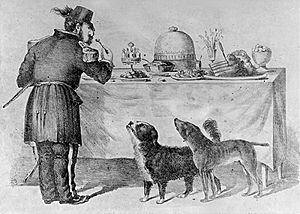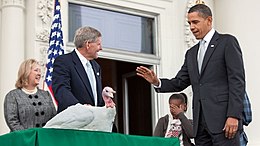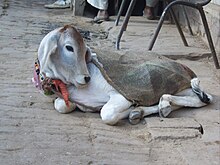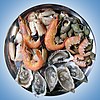Carnism: Difference between revisions
FourViolas (talk | contribs) Reverted to revision 698877237 by NewEnglandYankee (talk): WP:BRD. A Care2.com petition is not an RS. (TW) |
|||
| Line 121: | Line 121: | ||
==Non-academic reception== |
==Non-academic reception== |
||
[[File:Compassion is not a Crime.JPG|thumb|110x110px|Anita Krajnc case is about stopping trucks carrying pigs to slaughter and giving them water]] |
|||
Opinion pieces in ''[[The Huffington Post]]'', ''[[The Conversation (website)|The Conversation]]'', ''[[The Statesman]]'', and ''[[The Drum (TV program)|The Drum]]'' praised the idea, saying the term made it easier to discuss, and challenge, the practices of animal exploitation.<ref>{{cite web|last1=Spencer|first1=Stephan|title=Friend or Food? The Ideology of How We Decide|url=http://www.huffingtonpost.com/stephan-spencer/carnism_b_1876600.html|website=The Huffington Post: The Blog|date=13 Sep 2013|accessdate=19 August 2015}}</ref><ref>{{cite web|last1=Piazza|first1=Jared|title=Why are we outraged about eating dog, but not bacon?|url=http://theconversation.com/why-are-we-outraged-about-eating-dog-but-not-bacon-43796|publisher=The Conversation|date=24 June 2015|accessdate=19 August 2015}}</ref><ref>{{cite web|last1=Gandhi|first1=Maneka|title=From cuisine to corpses to ‘carnism’|url=http://www.thestatesman.com/mobi/news/8th-day/from-cuisine-to-corpses-to-carnism/73696.html|publisher=The Statesman|date=5 Jul 2015|accessdate=19 August 2015}}</ref><ref>{{cite web|last1=Fox|first1=Katrina|title=Eating meat isn't natural: it's carnism|url=http://www.abc.net.au/news/2010-06-18/35008|website=The Drum|publisher=ABC|date=28 Sep 2010|accessdate=19 August 2015}}</ref> |
Opinion pieces in ''[[The Huffington Post]]'', ''[[The Conversation (website)|The Conversation]]'', ''[[The Statesman]]'', and ''[[The Drum (TV program)|The Drum]]'' praised the idea, saying the term made it easier to discuss, and challenge, the practices of animal exploitation.<ref>{{cite web|last1=Spencer|first1=Stephan|title=Friend or Food? The Ideology of How We Decide|url=http://www.huffingtonpost.com/stephan-spencer/carnism_b_1876600.html|website=The Huffington Post: The Blog|date=13 Sep 2013|accessdate=19 August 2015}}</ref><ref>{{cite web|last1=Piazza|first1=Jared|title=Why are we outraged about eating dog, but not bacon?|url=http://theconversation.com/why-are-we-outraged-about-eating-dog-but-not-bacon-43796|publisher=The Conversation|date=24 June 2015|accessdate=19 August 2015}}</ref><ref>{{cite web|last1=Gandhi|first1=Maneka|title=From cuisine to corpses to ‘carnism’|url=http://www.thestatesman.com/mobi/news/8th-day/from-cuisine-to-corpses-to-carnism/73696.html|publisher=The Statesman|date=5 Jul 2015|accessdate=19 August 2015}}</ref><ref>{{cite web|last1=Fox|first1=Katrina|title=Eating meat isn't natural: it's carnism|url=http://www.abc.net.au/news/2010-06-18/35008|website=The Drum|publisher=ABC|date=28 Sep 2010|accessdate=19 August 2015}}</ref> |
||
An article in the beef industry publication Drovers Cattle Network criticized the use of the term, saying it implied that eating animal foods was a "psychological sickness".<ref>{{cite web|last1=Murphy|first1=Dan|title=Commentary: The carnist conundrum|url=http://www.cattlenetwork.com/cattle-news/Commentary-The-carnist-conundrum-128069853.html|publisher=Drovers Cattle Network|accessdate=19 August 2015|date=19 Aug 2011 |
An article in the beef industry publication Drovers Cattle Network criticized the use of the term, saying it implied that eating animal foods was a "psychological sickness".<ref>{{cite web|last1=Murphy|first1=Dan|title=Commentary: The carnist conundrum|url=http://www.cattlenetwork.com/cattle-news/Commentary-The-carnist-conundrum-128069853.html|publisher=Drovers Cattle Network|accessdate=19 August 2015|date=19 Aug 2011}}</ref> |
||
==See also== |
==See also== |
||
Revision as of 03:31, 9 January 2016
An editor has nominated this article for deletion. You are welcome to participate in the deletion discussion, which will decide whether or not to retain it. |
It has been suggested that this article be merged into Why We Love Dogs, Eat Pigs, and Wear Cows. (Discuss) Proposed since December 2015. |
 | |
| Description | Psychological theory about the ideology of animal use |
|---|---|
| Term coined by | Melanie Joy, 2001 |
| Related ideas | Anthrozoology, ethics of eating meat, speciesism, veganism, vegetarianism |
Carnism is a prevailing ideology that is argued to support the use animal products, especially meat.[n 1] The argument holds that carnism is a dominant belief system supported by a variety of defense mechanisms and mostly unchallenged assumptions.[1][2][3][4] The term was coined by social psychologist Melanie Joy in 2001 and popularized by her book Why We Love Dogs, Eat Pigs, and Wear Cows (2009).[5][6][7]
Central to the ideology, according to the theory, is the acceptance of meat-eating as "natural," "normal," "necessary," and (sometimes) "nice."[n 2] An important feature of carnism is the classification of only particular species of animal as food, and the acceptance of practices toward those animals that would be rejected as unacceptable cruelty if applied to other species. This classification is culturally relative, so that, for example, dogs are eaten in China but may be family members in the West, while cows are eaten in the West but protected in much of India.[1]
Another aspect is the meat paradox: the fact that most people care about animals yet embrace diets that necessitate harming them.[1][n 3] Psychologists suggest that this conflict between beliefs and behavior leads to cognitive dissonance, which they say meat-eaters relieve by avoiding consideration of the provenance of animal products, and by ascribing reduced sentience, cognitive ability and moral standing to animals they regard as food.[11][17][18]
Background
History
Although for most of history, meat-eating has not been controversial, arguments against eating animals date back to Ancient Greece. An early precedent for the idea of carnism appears in the writings of the Greek historian Plutarch, who in the first century CE sought to shift the burden of evidence from vegetarians to meat-eaters:[1][19]
Can you really ask what reason Pythagoras had for abstaining from flesh? For my part I rather wonder both by what accident and in what state of soul or mind the first man did so, touched his mouth to gore and brought his lips to the flesh of a dead creature, he who set forth tables of dead, stale bodies and ventured to call food and nourishment the parts that had a little before bellowed and cried, moved and lived.[20]
From the 17th century until recently, Cartesian mechanism was a prevailing philosophy in the West. This denied that animals are conscious and maintained that they were simply automata that react to external stimulation.[21][22] Notwithstanding the philosophical problem of defining consciousness, scientists now generally hold that animals have consciousness.[n 4]
Analyzing the history of vegetarianism and opposition to it from ancient Greece to the present day, literary scholar Renan Larue found certain commonalities in what he described as carnist arguments. According to him, carnists typically held that vegetarianism is a ludicrous idea unworthy of attention, that mankind is invested with dominion over animals by divine authority, and that abstaining from violence against animals would pose a threat to humans. He found that the views that farmed animals do not suffer, and that slaughter is preferable to death by disease or predation, gained currency in the nineteenth century, but that the former had precedent in the writings of Porphyry, a vegetarian who advocated the humane production of animal products which do not require animals to be slaughtered, such as wool.[27]
Origin of the term carnism
In the 1970s traditional views on the moral standing of animals were challenged by animal rights advocates, including psychologist Richard Ryder, who in 1971 introduced the notion of speciesism. This is defined as the assignment of value and rights to individuals solely on the basis of their species membership.[28] In 2001 psychologist and animal rights advocate Melanie Joy coined the term carnism for a form of speciesism that she argues underpins using animals for food, and particularly killing them for meat.[29] Joy compares carnism to patriarchy, arguing that both are dominant normative ideologies that go unrecognized because of their ubiquity:[1]
We don't see meat eating as we do vegetarianism – as a choice, based on a set of assumptions about animals, our world, and ourselves. Rather, we see it as a given, the "natural" thing to do, the way things have always been and the way things will always be. We eat animals without thinking about what we are doing and why, because the belief system that underlies this behavior is invisible. This invisible belief system is what I call carnism.[5]
Sandra Mahlke argues that carnism is the "central crux of speciesism" because the eating of meat motivates ideological justification for other forms of animal exploitation.[30]
Features
Justification
Joy introduced the idea of the "Three Ns of Justification," writing that meat-eaters regard meat consumption as "normal, natural, and necessary."[8][10] She argues that the "Three Ns" have been invoked to justify other ideologies, including slavery and denying women the right to vote, and are widely recognized as problematic only after the ideology they support has been dismantled.[31]
The argument holds that people are conditioned to believe that humans evolved to eat meat, that it is expected of them, and that they need it to survive or be strong. These beliefs are said to be reinforced by various institutions, including religion, family and the media. Although scientists have shown that humans get more than enough protein in their diets without eating meat,[32] the belief that meat is required persists.[9][10]
Building on Joy's work, psychologists conducted a series of studies in the United States and Australia, published in 2015, that found the great majority of meat-eaters' stated justifications for consuming meat were based on the "Four Ns" – "natural, normal, necessary, and nice." The arguments were that humans are omnivores (natural), that most people eat meat (normal), that vegetarian diets are lacking in nutrients (necessary), and that meat tastes good (nice).[9][10][33]
Meat-eaters who endorsed these arguments more strongly reported less guilt about their dietary habits. They tended to objectify animals, have less moral concern for them and attribute less consciousness to them. They were also more supportive of social inequality and hierarchical ideologies, and less proud of their consumer choices.[9]
Jeff Mannes writes that carnist attitudes are rooted in psychological and social defense mechanisms meant to relieve individuals of moral responsibility for violence against animals. In his view, Joy's "Three Ns" are part of a complex of defense mechanisms, which also include denial of a problem, such as through the "invisibility" of farm animals and the repression of unpleasant thoughts in relation to eating meat, and distorted perceptions, including the categorizations of animals as edible or not, and the objectification of farm animals.[34]
Edible or inedible
A central aspect of carnism is that animals are categorized as edible, inedible, pets, vermin, predators, or entertainment animals, according to people's schemata, mental classifications that determine, and are determined by, our beliefs and desires.[1][35] There is cultural variability regarding which animals count as food. Dogs are eaten in China, Thailand, Vietnam, Cambodia and South Korea, but elsewhere are not viewed as food, either because they are loved or, as in the Middle East and parts of India, regarded as unclean.[1][36] Cows are eaten in the West, but revered in much of India. Pigs are rejected by Muslims and Jews but widely regarded by other groups as edible.[37] Joy and other psychologists argue that these taxonomies determine how the animals within them are treated, influence subjective perceptions of their sentience and intelligence, and reduce or increase empathy and moral concern for them.[35]
Meat paradox
Mannes writes that carnism is rooted in a paradox between most people's values and actions: they oppose harming animals, and yet eat them. He argues that this conflict leads to cognitive dissonance, which people attempt to attenuate through psychic numbing.[34] The apparent conflict between caring about animals and embracing diets which require them to be harmed has been termed the "meat paradox."[12][17][18] Psychologists argue that this conflict between beliefs and behavior results in cognitive dissonance, which meat-eaters attempt to mitigate in several ways.[9][15][18] Bastian et al. (2011) found that people facilitate their practice of eating meat by minimizing the extent to which animals they eat have minds, emotional lives and moral standing.[13][38] Avoiding consideration of the provenance of animal products is another strategy.[13] Joy argues that this is why meat is rarely served with the animal's head or other intact body parts.[39]
Ascription of limited mental capacity

Psychologists argue that meat eaters reduce cognitive dissonance by minimizing their perception of animals as conscious and able to experience pain and suffering, particularly animals they regard as food.[13][15] This is a psychologically effective strategy, because organisms perceived as less able to suffer are considered to be of less moral concern, and therefore more acceptable as food.[12][40]
A 2010 study randomly assigned college students to eat beef jerky or cashews, then judge the moral relevance and cognitive abilities of a variety of animals. Compared with students who were given cashews, those who ate beef jerky expressed less moral concern for animals, and assigned cows a diminished ability to have mental states that entail the capacity to experience suffering.[17]
Studies in 2011 similarly found that people were more inclined to feel it was appropriate to kill animals for food when they perceived the animals as having diminished mental capacities; that, conversely, they perceived animals as having diminished mental capacities when told they were used as food; and, again, that eating meat caused participants to ascribe fewer mental abilities to animals. A separate study found that subjects who read a description of an exotic animal rated it as less sympathetic and less able to experience suffering if they were told that native people ate the animal.[12][13][41]
Other studies replicated the finding that meat-eaters ascribed fewer human-like qualities to animals than did vegetarians. Researchers have found that meat-eaters specifically consider traditionally edible animals less capable of experiencing refined emotions, even though meat-eaters and vegetarians did not differ in their evaluations of non-food animals.[42] Another study determined that perception of animals' intelligence is highly correlated with disgust at the thought of eating them, and that such perception is culturally influenced.[43]
"Saved from slaughter" narratives

An illustration of dissonance reduction is the prominence given to "saved from slaughter" stories, in which the media focus on one animal that evaded slaughter, while ignoring the millions that did not.[45]
Animals at the center of these narratives include Wilbur in Charlotte's Web (1952); the eponymous and fictional star of Babe (1995); Christopher Hogwood in Sy Montgomery's The Good, Good Pig (2006);[45] the Tamworth Two; and Cincinnati Freedom. The American National Thanksgiving Turkey Presentation is cited as another example. A 2012 study found that most media reporting on it celebrated the poultry industry while marginalizing the link between living animals and meat.[44]
Non-academic reception
Opinion pieces in The Huffington Post, The Conversation, The Statesman, and The Drum praised the idea, saying the term made it easier to discuss, and challenge, the practices of animal exploitation.[46][47][48][49] An article in the beef industry publication Drovers Cattle Network criticized the use of the term, saying it implied that eating animal foods was a "psychological sickness".[50]
See also
References
Explanatory notes
- ^ Gibert, Martin; Desaulniers, Élise (2014):"Carnism refers to the ideology conditioning people to consume certain animal products. It is essentially the opposite of veganism."[1]
- ^ Joy introduced the "Three Ns of Justification," namely that meat-eating is regarded as "normal, natural, and necessary."[8] Other psychologists developed this into the "Four Ns": "natural, normal, necessary, and nice."[9][10]
- ^ Loughnan et al. (2011): "Meat eating is morally problematic because it contrasts our desire to avoid hurting animals with our appetite for their flesh. This tension – to love animals and to love meat – is the essence of the meat paradox."[11][12]
Bastian et al. (2011): "Meat is central to most people's diets and a focus of culinary enjoyment (Fiddes, 1991). Yet most people also like animals and are disturbed by harm done to them. This inconsistency between a love for animals and enjoyment of meat creates a 'meat paradox' (Loughnan, Haslam, & Bastian, 2010); people's concern for animal welfare conflicts with their culinary behavior."[12][13][14][15][16]
- ^ Cambridge Declaration on Consciousness, 2012: "The absence of a neocortex does not appear to preclude an organism from experiencing affective states. Convergent evidence indicates that non-human animals have the neuroanatomical, neurochemical, and neurophysiological substrates of conscious states along with the capacity to exhibit intentional behaviors. Consequently, the weight of evidence indicates that humans are not unique in possessing the neurological substrates that generate consciousness. Non-human animals, including all mammals and birds, and many other creatures, including octopuses, also possess these neurological substrates."[23]
Ethologist Ian J. H. Duncan, 2006: "There seems to be some (but not universal) agreement that all the vertebrates are sentient. ... it is when we consider the invertebrates that the debate becomes intense."[24]
Ethologists continue to investigate emotion in animals and the cognitive abilities of different species, including self-awareness[25] and cognitive bias.[26]
Citations
- ^ a b c d e f g h Gibert, Martin; Desaulniers, Élise (2014). "Carnism". Encyclopedia of Food and Agricultural Ethics. Springer Netherlands. pp. 292–298. ISBN 978-94-007-0929-4.
{{cite book}}: External link in|chapterurl=|chapterurl=ignored (|chapter-url=suggested) (help)CS1 maint: multiple names: authors list (link) - ^ DeMello, Margo (2012). Animals and Society: An Introduction to Human-Animal Studies. New York: Columbia University Press. p. 138.
- ^ Dhont, Kristof; Hodson, Gordon (2014). "Why do right-wing adherents engage in more animal exploitation and meat consumption?", Personality and Individual Differences, 64, July (pp. 12–17), p. 4. doi:10.1016/j.paid.2014.02.002
- ^ Kool, V. K.; Agrawal, Rita (2009). "The Psychology of Nonkilling," in Joám Evans Pim (ed.),Toward a Nonkilling Paradigm, Center for Global Nonkilling, pp. 353–356.
- ^ a b Joy, Melanie (2011) [2009]. Why We Love Dogs, Eat Pigs, and Wear Cows: An Introduction to Carnism. Conari Press, p. 9. ISBN 1573245054.
- ^ Rose, Marla (8 November 2010). "An Interview with Dr. Melanie Joy", Encyclopaedia Britannica Advocacy for Animals.
- ^ Schott, Ben (11 January 2010). "Carnism", Schott's Vocab, The New York Times.
- ^ a b Joy 2011, p. 96.
- ^ a b c d e Piazza, Jared; et al. (August 2015). "Rationalizing meat consumption. The 4Ns". Appetite. 91: 114–128. doi:10.1016/j.appet.2015.04.011.
"How people defend eating meat", Lancaster University, 15 May 2015.
- ^ a b c d Singal, Jesse (4 June 2015). "The 4 Ways People Rationalize Eating Meat", New York Magazine.
- ^ a b Loughnan, Steve; Bratanova, Boyka; Puvia, Elisa (2011). "The Meat Paradox: How Are We Able to Love Animals and Love Eating Animals?", In-Mind Italia, 1, pp. 15–18.
- ^ a b c d e Loughnan, Steve; Bastian, Brock; Haslam, Nick (2014). "The Psychology of Eating Animals", Current Directions in Psychological Science, 23(2), April, pp. 104–108. doi:10.1177/0963721414525781
- ^ a b c d e f Bastian, Brock; et al. (2011). "Don't mind meat? The denial of mind to animals used for human consumption" (PDF). Personality and Social Psychology Bulletin. 38 (2): 247–256. doi:10.1177/0146167211424291.
- ^ Bastian, Brock (23 March 2011). "The meat paradox: how we can love some animals and eat others", The Conversation.
- ^ a b c Rothgerber, Hank (August 2014). "Efforts to overcome vegetarian-induced dissonance among meat eaters". Appetite. 79: 32–41. doi:10.1016/j.appet.2014.04.003.
- ^ Hodson, Gordon (3 March 2014). "The Meat Paradox: Loving but Exploiting Animals", Psychology Today.
- ^ a b c Loughnan, Steve; et al. (2010). "The role of meat consumption in the denial of moral status and mind to meat animals". Appetite. 55 (1): 156–159. doi:10.1016/j.appet.2010.05.043. PMID 20488214.
- ^ a b c Fawcett, Anne (2013). "Euthanasia and morally justifiable killing in a veterinary clinical context," in Jay Johnston, Fiona Probyn-Rapsey (eds.), Animal Death, Sydney: Sydney University Press, p. 215.
- ^ DeMello 2012, pp. 142, 379.
- ^ Plutarch, translated by W. Heinemann (1957). De esu carnium (On Eating Meat), Loeb Classical Library Ed., Vol. XII. Harvard University Press. p. 541.
- ^ Allen, Colin; Trestman, Michael (10 June 2015). "Animal Consciousness: Historical background". Stanford Encyclopedia of Philosophy.
{{cite web}}: CS1 maint: multiple names: authors list (link) - ^ Joy, M. (2005). "Humanistic Psychology and Animal Rights: Reconsidering the Boundaries of the Humanistic Ethic". Journal of Humanistic Psychology. 45 (1). SAGE: 106–130. doi:10.1177/0022167804272628.
{{cite journal}}:|access-date=requires|url=(help) - ^ Low, Philip; et al. (7 July 2012). "The Cambridge Declaration on Consciousness" (PDF). Consciousness in Human and Non-human Animals, Francis Crick Memorial Conference, Churchill College, Cambridge.
- ^ Duncan, Ian J. H. (October 2006). "The changing concept of animal sentience". Applied Animal Behaviour Science. 100: 11–19. doi:10.1016/j.applanim.2006.04.011.
- ^ Bekoff, Marc (2009). Animal Passions and Beastly Virtues, Temple University Press.
- ^ Haselton, M. G., Nettle, D., & Andrews, P. W. (2005). The evolution of cognitive bias. In D. M. Buss (Ed.), The Handbook of Evolutionary Psychology: Hoboken, NJ, US: John Wiley & Sons Inc. pp. 724–746.
{{cite book}}: CS1 maint: multiple names: authors list (link) - ^ Desaulniers, Élise (30 January 2015). "Le végétarisme et ses ennemis: entrevue avec Renan Larue". Retrieved 6 August 2015.
- ^ Ryder, Richard D. (1971). "Experiments on Animals," in Stanley Godlovitch, Roslind Godlovitch, John Harris (eds.), Animals, Men and Morals, Grove Press.Ryder, Richard D. (2009). "Speciesism," in Marc Bekoff (ed.), Encyclopedia of Animal Rights and Animal Welfare, Greenwood; Diamond, Cora (2004). "Eating Meat and Eating People," in Cass Sunstein, Martha Nussbaum (eds.), Animal Rights: Current Debates and New Directions, Oxford University Press, p. 93.
- ^ Joy, Melanie (2001). "From Carnivore to Carnist: Liberating the Language of Meat", Satya, 18(2), September, pp. 126–127; Joy, Melanie (2003). Psychic Numbing and Meat Consumption: The Psychology of Carnism, doctoral dissertion, Saybrook Graduate School, San Francisco.
- ^ Mahlke, Sandra (2014). Das Machtverhältnis zwischen Mensch und Tier im Kontext sprachlicher Distanzierungsmechanismen: Anthropozentrismus, Speziesismus und Karnismus in der kritischen Diskursanalyse. Diplomica Verlag. ISBN 978-3-8428-9140-1.
- ^ Joy 2011, p. 97.
- ^ Greger, Michael (6 June 2014). "Do vegetarians get enough protein?".
- ^ Goodyer, Paula (1 June 2015). "Meat eaters justify diet using 'Four Ns': natural, necessary, normal, nice". Sydney Morning Herald.
- ^ a b Mannes,Jeff (2015). "Karnismus". Lexikon der Mensch-Tier-Beziehungen. Transcript Verlag. pp. 191–193. ISBN 978-3-8376-2232-4.
- ^ a b Joy 2011, pp. 14, 17.
- ^ Herzog, Hal (2011). "Having Your Dog and Eating It Too?", Psychology Today.
- ^ Lavin 2013, pp. 116–117.
- ^ Presser, Lois (2013). Why We Harm, New Brunswick, NJ: Rutgers University Press, pp. 50–68.
- ^ Joy 2011, p. 16.
- ^ Waytz, Adam; Gray, Kurt; Epley, Nicholas; Wegner, Daniel M. (2010). "Causes and consequences of mind perception" (PDF). Trends in Cognitive Sciences. 14 (8): 383–388. doi:10.1016/j.tics.2010.05.006.
- ^ Bratanova, Boyka; et al. (2011). "The effect of categorization as food on the perceived moral standing of animals". Appetite. 57 (1): 193–196. doi:10.1016/j.appet.2011.04.020. PMID 21569805.
- ^ Bilewicz, Michal; Imhoff, Roland; Drogosz, Marek (2011). "The humanity of what we eat: Conceptions of human uniqueness among vegetarians and omnivores" (PDF). European Journal of Social Psychology. 41: 201–209. doi:10.1002/ejsp.766.
- ^ Ruby, Matthew B.; Heine, Steven J. (March 2012). "Too close to home. Factors predicting meat avoidance" (PDF). Appetite. 59: 47–52. doi:10.1016/j.appet.2012.03.020.
- ^ a b Packwood-Freeman, Carrie; Perez, Oana Leventi (2012). "Pardon Your Turkey and Eat Him Too," in Joshua Frye, Michael S. Bruner (eds.), The Rhetoric of Food: Discourse, Materiality, and Power, Routledge, p. 103ff.
- ^ a b Mizelle, Brett (2015). "Unthinkable Visibility: Pigs, Pork and the Spectacle of Killing and Meat," in Marguerite S. Shaffer, Phoebe S. K. Young (eds.), Rendering Nature: Animals, Bodies, Places, Politics, University of Pennsylvania Press, p. 264; Mizelle, Brett (2012). Pig, Reaktion Books, pp. 105–106.
- ^ Spencer, Stephan (13 Sep 2013). "Friend or Food? The Ideology of How We Decide". The Huffington Post: The Blog. Retrieved 19 August 2015.
- ^ Piazza, Jared (24 June 2015). "Why are we outraged about eating dog, but not bacon?". The Conversation. Retrieved 19 August 2015.
- ^ Gandhi, Maneka (5 Jul 2015). "From cuisine to corpses to 'carnism'". The Statesman. Retrieved 19 August 2015.
- ^ Fox, Katrina (28 Sep 2010). "Eating meat isn't natural: it's carnism". The Drum. ABC. Retrieved 19 August 2015.
- ^ Murphy, Dan (19 Aug 2011). "Commentary: The carnist conundrum". Drovers Cattle Network. Retrieved 19 August 2015.
Further reading
- Herzog, Hal (2010). Some We Love, Some We Hate, Some We Eat, Harper Collins.
- Joy, Melanie (2015). "Beyond carnism and toward rational, authentic food choices", TEDx talk.
- Vialles, Noëlie (1994). Animal to Edible, Cambridge: Cambridge University Press.







